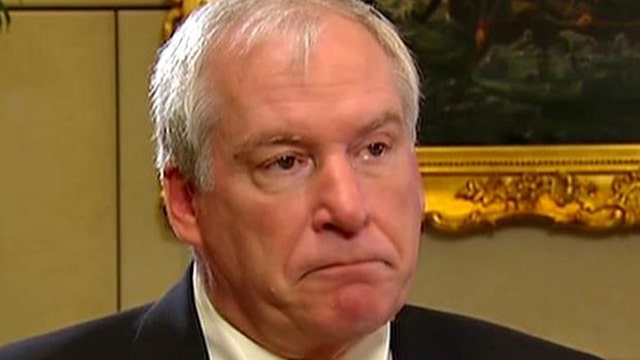Fed's Rosengren Urges 'Patience' on Rate Hike
Boston Federal Reserve President Eric Rosengren told FOX Business on Tuesday the central bank should remain “patient” as it prepares to raise interest rates from historic lows set in the wake of the 2008 financial crisis.
“We should be patient until we get the economic outcomes we want,” Rosengren told FBN's Peter Barnes.“It makes sense to make sure we get the improving economy we want to see.”
Rosengren, a non-voting but influential member of the policy-setting Federal Open Market Committee, said the Fed should avoid tying a rate hike to a “calendar date,” and instead hold off until inflation rises to the Fed’s target rate of 2%.
“I wouldn’t tie it to a calendar day. I’d tie it to the economic outcomes,” he said.
Rosengren was likely speaking for the broader Fed consensus led by inflation doves including Fed Chair Janet Yellen, who has long preached a cautious approach toward raising interest rates.
Inflation doves are concerned that making borrowing more expensive by raising rates would make it harder for consumers to buy homes, cars and other big ticket items, as well as increasing the costs for businesses to borrow money to expand. All of which could pose threats to ongoing economic recovery.
The Fed has made clear it hopes to raise rates some time in 2015, possibly as early as June. The central bank ended its bond buying program known as quantitative easing last month and has repeatedly stated its intention to return monetary policy to “normalcy” after years of massive stimulus following the financial crisis.
Yellen has said the Fed won’t raise rates until the economy achieves the central bank’s dual mandate of full employment and price stability, which she has defined as an unemployment rate range of 5.2%- 5.6% and an inflation rate range of 1.7%-2%.
Rosengren echoed those sentiments Tuesday and added that most economic forecasts predict the economy is headed in that direction. The unemployment rate has been falling rapidly in recent months, hitting a six-year low of 5.8% in October. But inflation has remained stubbornly low, hovering at about 1.5%, held down by stagnant wages, soft commodity prices and weak growth in Europe and China.
Those factors have raised concerns for deflation, or rapidly falling prices, which is just as problematic as runaway inflation. But Rosengren told FOX Business there's no current serious threat of deflation in the U.S.
Rosengren suggested the next move for the Fed will be to prepare markets for an eventual hike by telegraphing the move through its statements.
For months, the Fed, in an effort to reassure markets that rates won’t move higher too soon, has said rates will remain low “for a considerable period” after QE ends. But with the labor market clearly strengthening, analysts are now looking for the FOMC to remove that statement at one of its upcoming meetings to let markets know a rate hike is coming sooner rather than later.




















